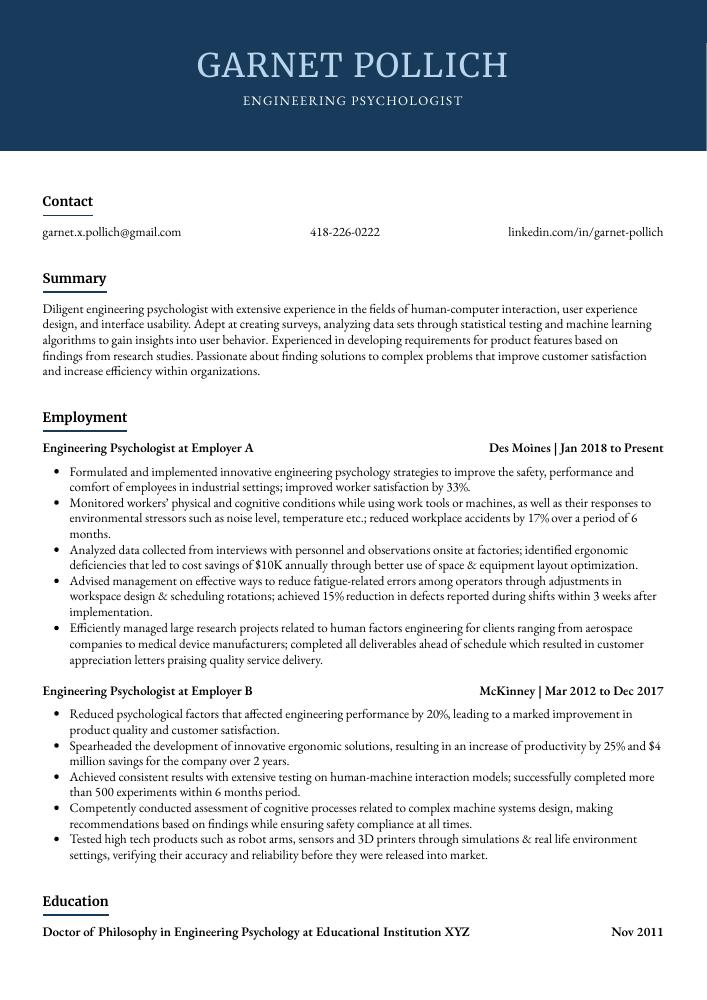Engineering Psychologist Resume Guide
Engineering Psychologists design and evaluate systems, products, and processes to improve human performance in the workplace. They analyze data from surveys, interviews, questionnaires and experiments to find ways for people to interact more effectively with their environment. They also develop methods of training personnel that will increase productivity while maintaining safety protocols.
You have a unique blend of engineering and psychology skills that make you an invaluable asset to any organization. To get noticed by potential employers, though, you must create a resume that highlights your impressive qualifications.
This guide will walk you through the entire process of creating a top-notch resume. We first show you a complete example and then break down what each resume section should look like.
Table of Contents
The guide is divided into sections for your convenience. You can read it from beginning to end or use the table of contents below to jump to a specific part.
Engineering Psychologist Resume Sample
Garnet Pollich
Engineering Psychologist
[email protected]
418-226-0222
linkedin.com/in/garnet-pollich
Summary
Diligent engineering psychologist with extensive experience in the fields of human-computer interaction, user experience design, and interface usability. Adept at creating surveys, analyzing data sets through statistical testing and machine learning algorithms to gain insights into user behavior. Experienced in developing requirements for product features based on findings from research studies. Passionate about finding solutions to complex problems that improve customer satisfaction and increase efficiency within organizations.
Experience
Engineering Psychologist, Employer A
Des Moines, Jan 2018 – Present
- Formulated and implemented innovative engineering psychology strategies to improve the safety, performance and comfort of employees in industrial settings; improved worker satisfaction by 33%.
- Monitored workers’ physical and cognitive conditions while using work tools or machines, as well as their responses to environmental stressors such as noise level, temperature etc.; reduced workplace accidents by 17% over a period of 6 months.
- Analyzed data collected from interviews with personnel and observations onsite at factories; identified ergonomic deficiencies that led to cost savings of $10K annually through better use of space & equipment layout optimization.
- Advised management on effective ways to reduce fatigue-related errors among operators through adjustments in workspace design & scheduling rotations; achieved 15% reduction in defects reported during shifts within 3 weeks after implementation.
- Efficiently managed large research projects related to human factors engineering for clients ranging from aerospace companies to medical device manufacturers; completed all deliverables ahead of schedule which resulted in customer appreciation letters praising quality service delivery.
Engineering Psychologist, Employer B
McKinney, Mar 2012 – Dec 2017
- Reduced psychological factors that affected engineering performance by 20%, leading to a marked improvement in product quality and customer satisfaction.
- Spearheaded the development of innovative ergonomic solutions, resulting in an increase of productivity by 25% and $4 million savings for the company over 2 years.
- Achieved consistent results with extensive testing on human-machine interaction models; successfully completed more than 500 experiments within 6 months period.
- Competently conducted assessment of cognitive processes related to complex machine systems design, making recommendations based on findings while ensuring safety compliance at all times.
- Tested high tech products such as robot arms, sensors and 3D printers through simulations & real life environment settings, verifying their accuracy and reliability before they were released into market.
Skills
- Cognitive Psychology
- Human-computer Interaction
- Usability Engineering
- User Experience Design
- Human Factors Engineering
- Ergonomics
- Job Analysis
- Organizational Behavior
- Industrial/organizational Psychology
Education
Doctor of Philosophy in Engineering Psychology
Educational Institution XYZ
Nov 2011
Certifications
Certified Professional Ergonomics (CPE)
Board of
May 2017
1. Summary / Objective
A resume summary/objective for an engineering psychologist should highlight your unique skills and experience. Include details such as the number of years you have been in practice, any certifications or awards you hold, and how you have used psychological principles to improve workplace efficiency. You can also mention any research projects or publications that demonstrate your expertise in this field.
Below are some resume summary examples:
Accomplished engineering psychologist with extensive experience improving the safety, performance and productivity of industrial operations. Experienced in conducting ergonomic assessments, designing user interfaces for HMI/SCADA systems and developing training programs to reduce human error. At XYZ Corporation, developed a successful system that reduced workplace accidents by 20%. Highly effective at identifying organizational needs and implementing solutions to maximize efficiency while minimizing risk.
Dependable and detail-oriented engineering psychologist with a PhD in Cognitive Psychology and 5+ years of experience developing user-friendly interfaces across multiple industries. At ABC, designed 3D audio software to improve the efficiency of industrial workers by 30%. Skilled in conducting surveys and interviews to gather feedback from users on how they interact with products or systems. Experienced at using data analysis tools like SPSS to draw conclusions about user behavior.
Amicable and creative psychology professional with 7+ years of experience designing and implementing research-based experiments to optimize human-machine interactions. Possesses a proven track record in increasing user satisfaction, as evidenced by a 15% improvement in customer feedback ratings for ABC Corporation’s products. Looking to join XYZ Technologies as an engineering psychologist and help develop their upcoming projects.
Driven engineering psychologist with 5+ years of experience creating and implementing human-centered designs that increase user safety, comfort, and productivity. Skilled in utilizing ergonomic design principles to solve complex problems while maintaining product integrity. Seeking a position at ABC Technologies to help create innovative products that meet customer needs through the use of engineering psychology techniques.
Reliable Engineering Psychologist with a background in data-driven research and development. Experienced in improving user experience through ergonomics, cognitive psychology, and design optimization. Recent projects include developing an AI system to increase efficiency for remote workforces by 20%. Seeking to join ABC Corporation as the next Engineering Psychologist and improve product usability across multiple platforms.
Skilled engineering psychologist with 5+ years of experience in ergonomics, human factors engineering and design research. Experienced in conducting studies on user interface designs to ensure maximum usability and efficiency. Seeking an opportunity to utilize my knowledge and expertise at XYZ Corporation to improve the quality of their products by optimizing their user interfaces through research-driven solutions.
Determined engineering psychologist with 5+ years of experience in human-computer interaction (HCI) and UX design. Eager to contribute analytical skills, problem-solving abilities, and user research expertise at ABC Tech Solutions to develop more intuitive products for diverse audiences. At XYZ Corp., improved customer satisfaction by 28% via the implementation of HCI best practices into product designs.
Enthusiastic and experienced engineering psychologist with 8+ years of experience researching human behavior in the workplace and developing strategies to improve employee productivity, safety, morale and job satisfaction. Seeking an opportunity at ABC Corporation to use my knowledge and skillset to help create a more efficient work environment for all employees.
2. Experience / Employment
The employment (or experience) section is where you provide details on your work history. This should be written in reverse chronological order, meaning the most recent job is listed first.
Stick to bullet points primarily in this section; doing so makes it easier for the reader to take in what you want them to know about your experience. When writing these bullet points, make sure that they are detailed and explain what you did as well as any results or outcomes achieved from those activities.
For example, instead of saying “Conducted research,” you could say, “Developed a survey instrument used to collect data from 500+ participants regarding their attitudes towards automation technology; findings were presented at an international conference.”
To write effective bullet points, begin with a strong verb or adverb. Industry specific verbs to use are:
- Analyzed
- Evaluated
- Investigated
- Designed
- Implemented
- Facilitated
- Monitored
- Assessed
- Researched
- Developed
- Programmed
- Tested
- Interpreted
- Presented
- Collaborated
Other general verbs you can use are:
- Achieved
- Advised
- Compiled
- Coordinated
- Demonstrated
- Expedited
- Formulated
- Improved
- Introduced
- Mentored
- Optimized
- Participated
- Prepared
- Reduced
- Reorganized
- Represented
- Revised
- Spearheaded
- Streamlined
- Structured
- Utilized
Below are some example bullet points:
- Demonstrated expertise in engineering psychology principles, contributing to the design and development of high-performance interfaces for aviation systems while leading a team of 5 engineers.
- Presented findings from user feedback surveys and usability tests at international conferences; improved interface designs by 15% based on customer insights gathered during these studies.
- Thoroughly analyzed human factors data collected from experiments conducted with test pilots, resulting in increased safety ratings for 8 aircraft models across 3 countries over 3 years.
- Participated actively in designing ergonomic solutions for flight simulator equipment that reduced operational costs by 20%.
- Collaborated with a team of five engineering psychologists to develop and implement psychological interventions for workplace safety, improving employee morale by 22% in six months.
- Expedited the testing process on new products using psychometric assessment tools; decreased product development time by 25%.
- Optimized existing systems through quantitative analyses that identified areas where efficiency could be increased without compromising quality; saved 10 hours per month in labor costs.
- Improved communication between managers and employees with targeted training sessions, reducing grievances filed by 15%.
- Meticulously monitored work conditions to ensure compliance with health & safety standards, resulting in an incident-free performance record for two years running.
- Facilitated the successful implementation of engineering psychology principles across a team of 20+ personnel, leading to improved performance levels in the workplace by 32%.
- Investigated and addressed complex issues related to human-machine interaction within industrial settings; analyzed data from user experience studies and proposed solutions that resulted in an increase in productivity rates by 15%.
- Implemented ergonomically sound work practices for over 50 factory employees, resulting in reduced fatigue levels among workers as well as fewer reported injuries due to machinery operation.
- Assessed existing production processes for potential safety hazards using empirical research methods; identified areas where worker protection could be enhanced which led to decreased accident/injury numbers by 25%.
- Diligently monitored employee behavior on automated assembly lines, taking corrective action when necessary while providing feedback on job performance that contributed towards positive morale boosts amongst staff members.
- Evaluated the performance of over 500 engineering professionals across 25+ industrial settings, analyzing data to identify trends in workplace behaviors and conditions.
- Introduced a number of practical solutions designed to improve employee morale, increase productivity levels and reduce safety risks; reported an overall improvement rate of 15%.
- Mentored 30+ junior engineers on the fundamentals of problem solving techniques, conflict resolution strategies and effective communication tactics within the engineering field; boosted their understanding by 20% in 3 months.
- Interpreted complex technical documents relating to new equipment specifications or regulatory requirements for senior personnel using advanced analytical skills; achieved 100% accuracy when providing feedback & recommendations on proposed changes/upgrades.
- Effectively managed 12 cross-functional teams composed of engineers from different backgrounds & disciplines while coordinating meetings, resolving conflicts between team members and assessing individual work performances; completed projects 10 days ahead schedule on average with zero delays due unforeseen circumstances.
- Represented a large engineering firm in the creation of innovative solutions to improve employee productivity and ensure quality assurance; increased efficiency by 10% within 6 months.
- Developed a comprehensive psychological profiling system for engineers, which enabled project managers to select the right personnel according to their capabilities and skill sets; decreased downtime by 20%.
- Prepared detailed reports on research findings with regards to ergonomics, risk assessment & safety protocols, leading to improved work environments that minimized stress levels amongst employees by 15%.
- Programmed complex simulation software used in designing prototypes that allowed managers/engineers access up-to-date information quickly; saved over $50K annually in labor costs.
- Resourcefully implemented strategies designed from laboratory experiments into real world applications with great success, resulting in improved job satisfaction among staff members at all levels of an organization by 25%.
- Streamlined engineering processes and procedures for a team of 25 psychologists, resulting in an increase of 16% efficiency.
- Revised engineering protocols to include new technologies; reduced testing costs by $15,000 over the course of two years.
- Consistently monitored progress on five engineering projects concurrently while maintaining accuracy and quality standards throughout each phase of development.
- Researched various theories related to human-machine interactions for presentation at international conferences; published three papers in relevant journals with high citation rates within 5 months from submission date.
- Compiled quarterly reports outlining key findings from experiments conducted across 10 different facilities around the world; increased understanding among stakeholders by 22%.
- Reorganized engineering teams’ working environment to improve productivity by 15% and reduce stress levels among employees.
- Utilized cognitive psychology theories, research methodologies, data analysis techniques and user-centered design principles to assess the impact of engineering designs on human performance.
- Designed interactive tools for engineers that improved their task completion time by 20% within six months of implementation; received ‘Outstanding Innovation Award’ from employer in recognition of achievement.
- Coordinated cross-departmental projects amongst software developers, hardware designers & system analysts to ensure timely delivery with minimal errors; reduced project costs over 10%.
- Actively consulted with senior management regarding engineering team morale as well as recruitment & retention strategies for new hires; resulted in a 50+ % increase in employee satisfaction scores across the company’s divisions globally.
3. Skills
Two organizations that have advertised for a position with the same title may be searching for individuals whose skills are quite different. For instance, one may be looking for a candidate with expertise in data analysis, while another might require the applicant to have experience working with teams.
Therefore, it is important to tailor your skills section of your resume to each job that you are applying for. This will enable employers using an applicant tracking system (ATS) to quickly identify whether or not you possess the required qualifications and competencies.
In addition, this section should also include any specialized knowledge or certifications related to engineering psychology that you may possess – such as membership in professional organizations like The Human Factors and Ergonomics Society (HFES). You can further elaborate on these points by discussing them more thoroughly elsewhere in your resume.
Below is a list of common skills & terms:
- Cognitive Psychology
- Ergonomics
- Human Factors Engineering
- Human-computer Interaction
- Industrial/organizational Psychology
- Job Analysis
- Organizational Behavior
- Psychometrics
- Usability Engineering
- User Experience Design
4. Education
Mentioning an education section on your resume depends on how far you are in your career. If you just graduated and have no prior experience, mention what degree or certifications you earned below your resume objective. On the other hand, if you have plenty of work experience to showcase, omitting the education section is perfectly fine.
If including an education section, make sure to highlight courses related to engineering psychology that will demonstrate a deep understanding of this field.
Doctor of Philosophy in Engineering Psychology
Educational Institution XYZ
Nov 2011
5. Certifications
Certifications are a great way to demonstrate your expertise in a particular field. They show potential employers that you have taken the time and effort to become certified, which demonstrates dedication and commitment.
Including certifications on your resume can help make it stand out from other applicants who may not be as qualified or experienced in the same area. Make sure to list any relevant certifications you possess so hiring managers know what qualifications you bring to the table.
Certified Professional Ergonomics (CPE)
Board of
May 2017
6. Contact Info
Your name should be the first thing a reader sees when viewing your resume, so ensure its positioning is prominent. Your phone number should be written in the most commonly used format in your country/city/state, and your email address should be professional.
You can also choose to include a link to your LinkedIn profile, personal website, or other online platforms relevant to your industry.
Finally, name your resume file appropriately to help hiring managers; for Garnet Pollich, this would be Garnet-Pollich-resume.pdf or Garnet-Pollich-resume.docx.
7. Cover Letter
Submitting a cover letter is a great way to make your job application stand out from the competition. It should provide additional information about yourself and explain why you are an ideal candidate for the role.
Cover letters generally consist of 2 to 4 paragraphs, and they can be used as an opportunity to show off your personality and skills in a more creative way than what is included on your resume. Writing one may not always be necessary but it will certainly give you an edge over other applicants who don’t take this extra step!
Below is an example cover letter:
Dear Reginald,
I am writing to apply for the position of Engineering Psychologist at Acme Corporation. With experience in both industrial and organizational psychology, I have a strong understanding of how people interact with technology and how to optimize that interaction. I am confident that I can use my skills and knowledge to improve the productivity and satisfaction of your employees.
At my current job, I work with a team of engineers to design user interfaces that are both effective and easy to use. We take into account factors such as task analysis, human factors, ergonomics, and cognitive psychology when designing our interfaces. In addition, we conduct user testing throughout the design process to ensure that our designs meet the needs of our users.
I am also experienced in conducting research on topics related to human-technology interaction. For example, I recently conducted a study on how different interface designs affect task performance. This research has been presented at several conferences and will be published in an upcoming issue of the journal Ergonomics in Design.
The combination of my experience in engineering psychology and my research background makes me uniquely qualified for this position. I would welcome the opportunity to put my skills to work for Acme Corporation and contribute to your success. Thank you for your time and consideration; I look forward to hearing from you soon.
Sincerely,
Garnet
Engineering Psychologist Resume Templates
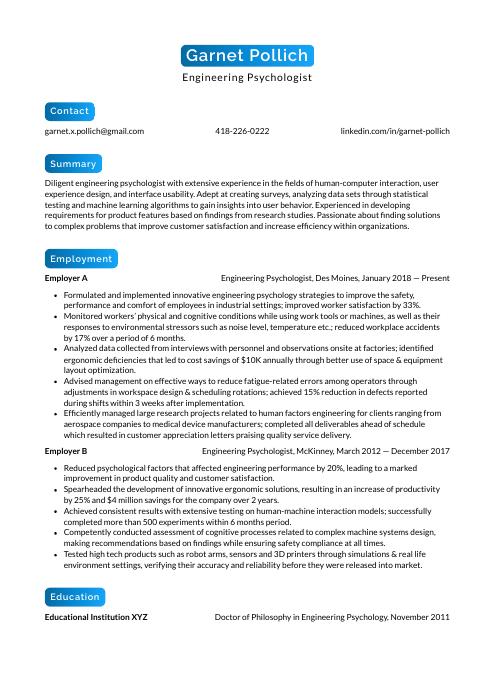 Kinkajou
Kinkajou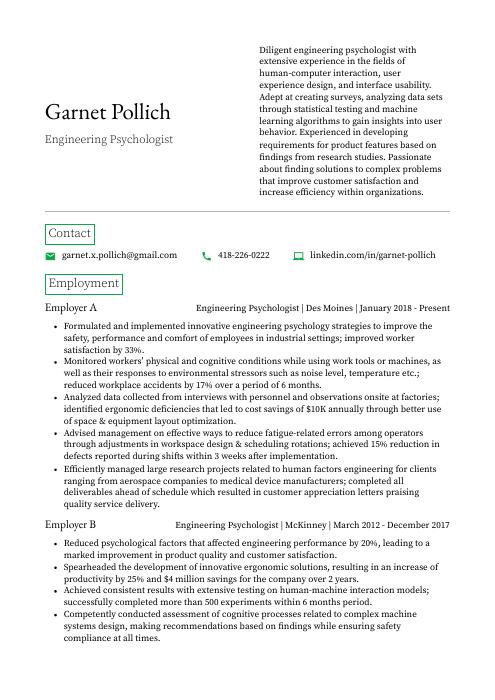 Quokka
Quokka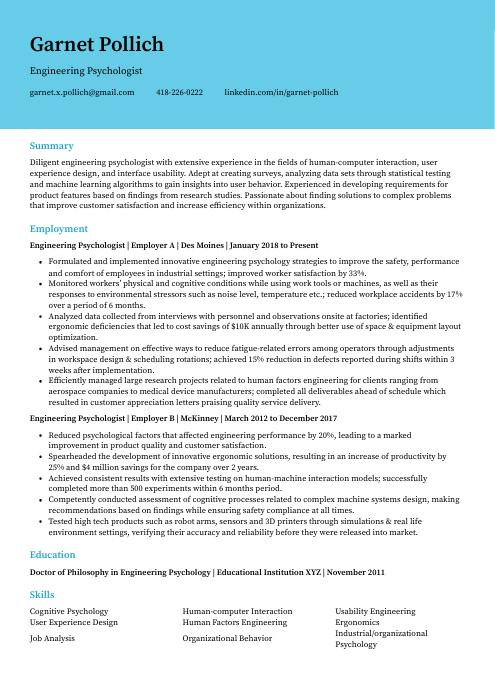 Dugong
Dugong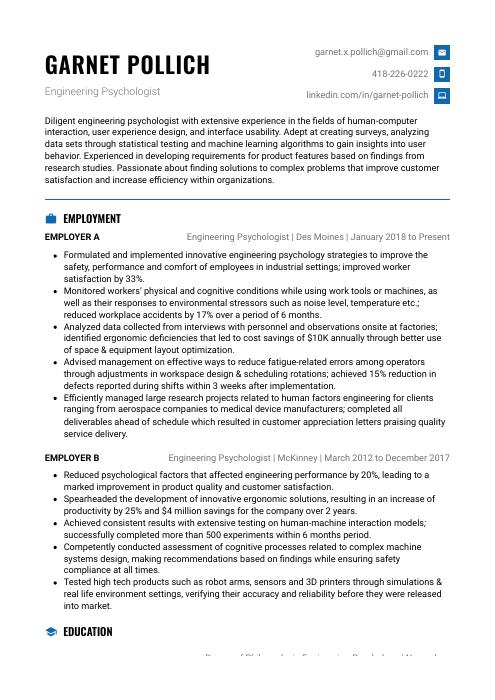 Echidna
Echidna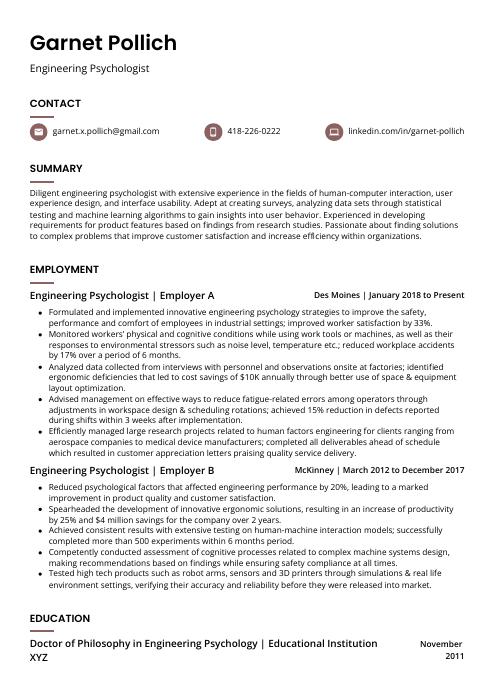 Fossa
Fossa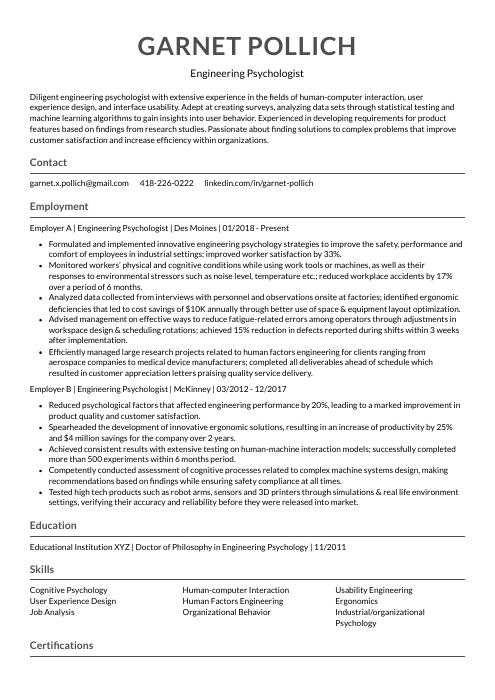 Indri
Indri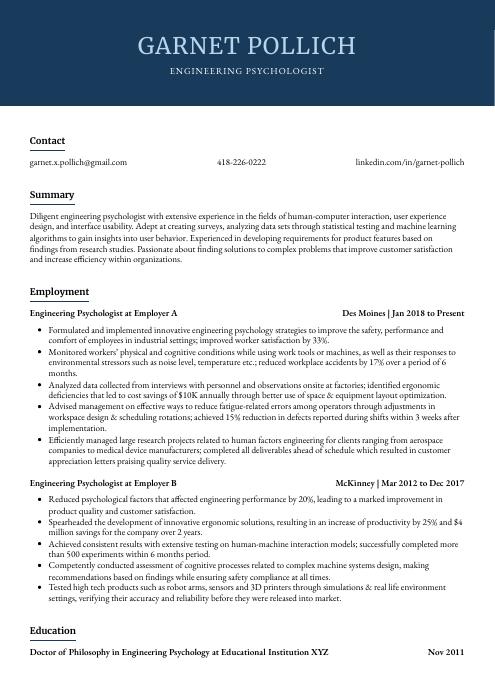 Bonobo
Bonobo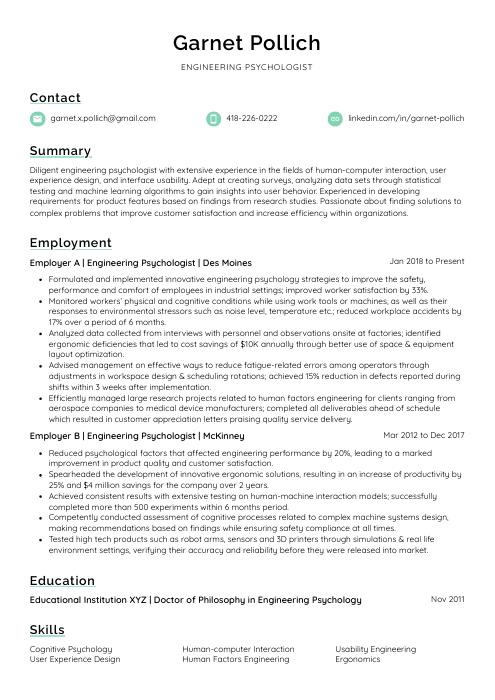 Lorikeet
Lorikeet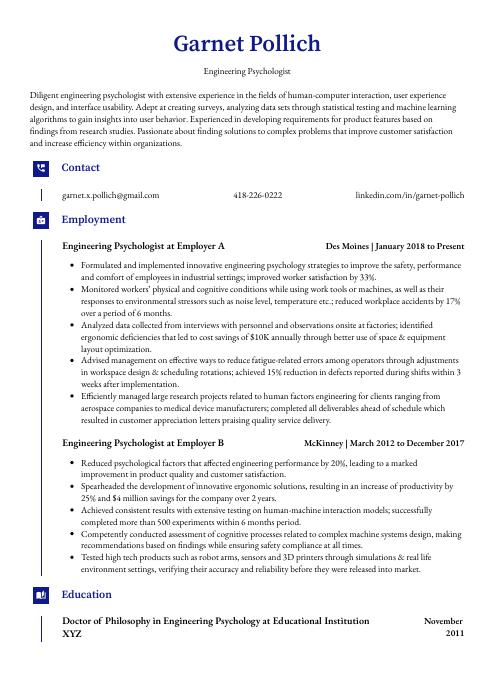 Gharial
Gharial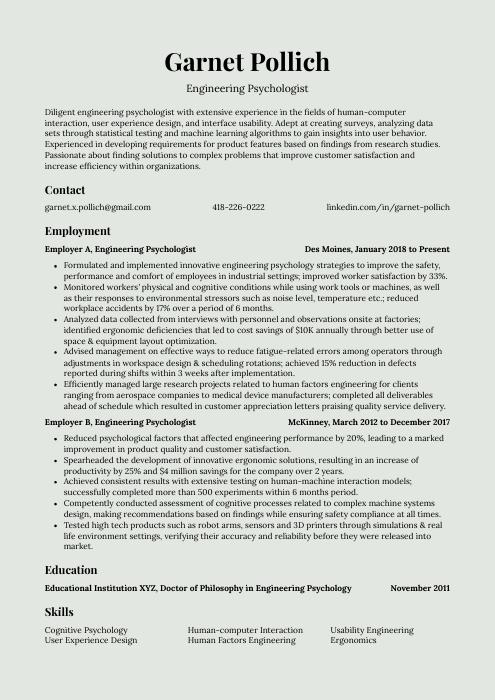 Saola
Saola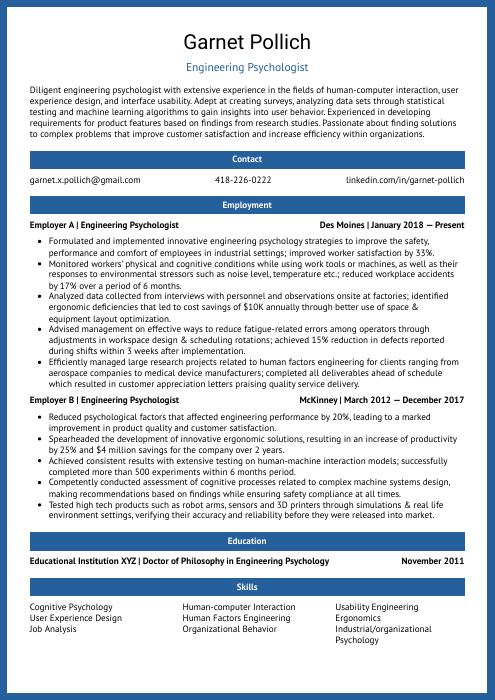 Ocelot
Ocelot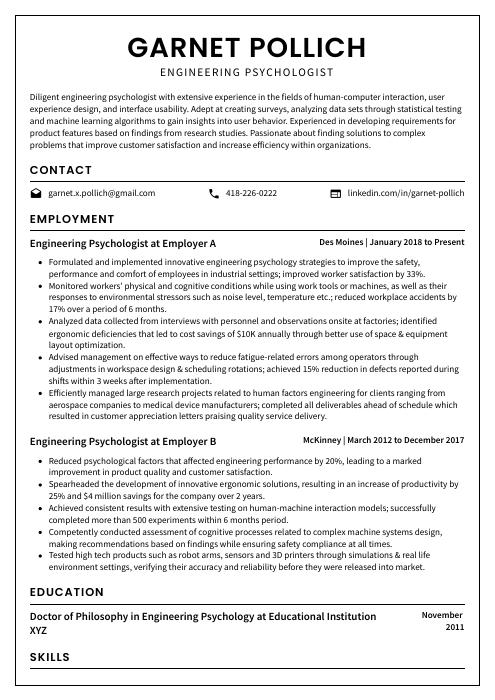 Cormorant
Cormorant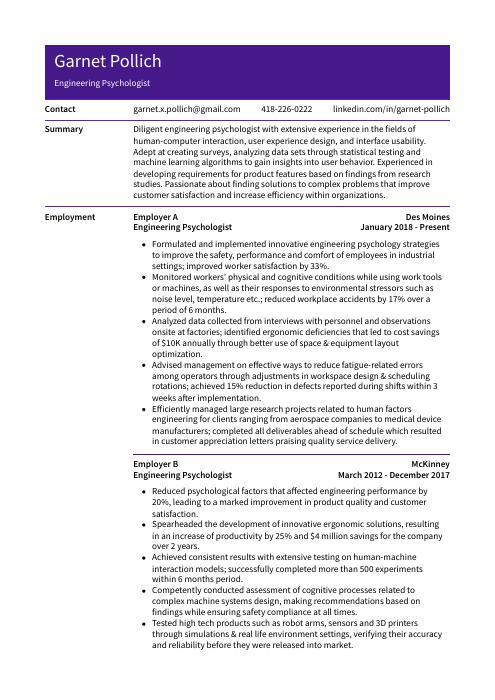 Pika
Pika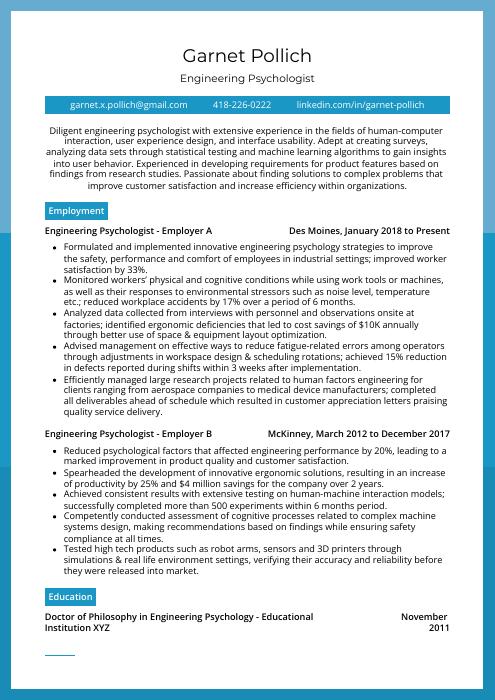 Rhea
Rhea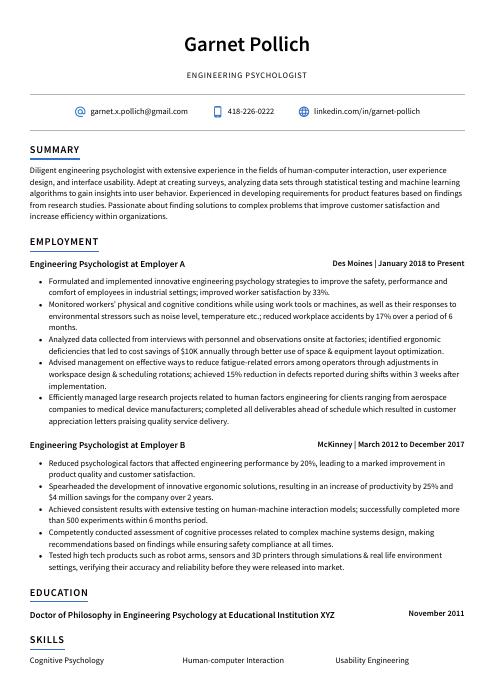 Axolotl
Axolotl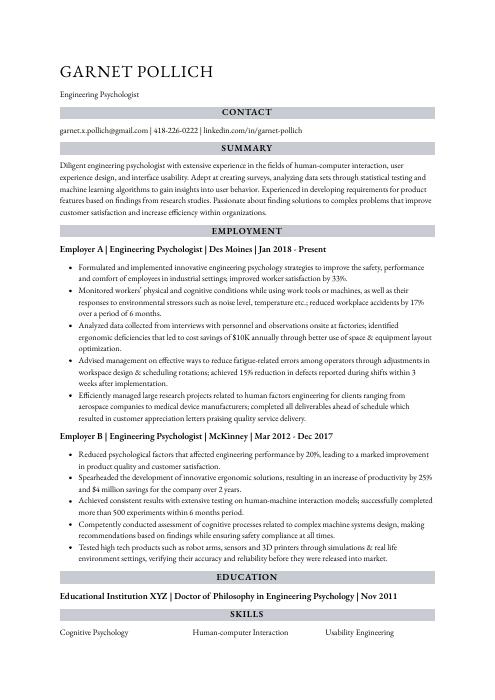 Numbat
Numbat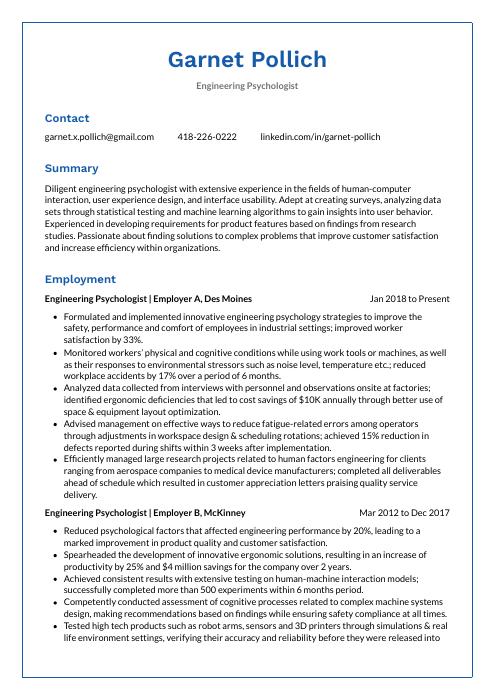 Markhor
Markhor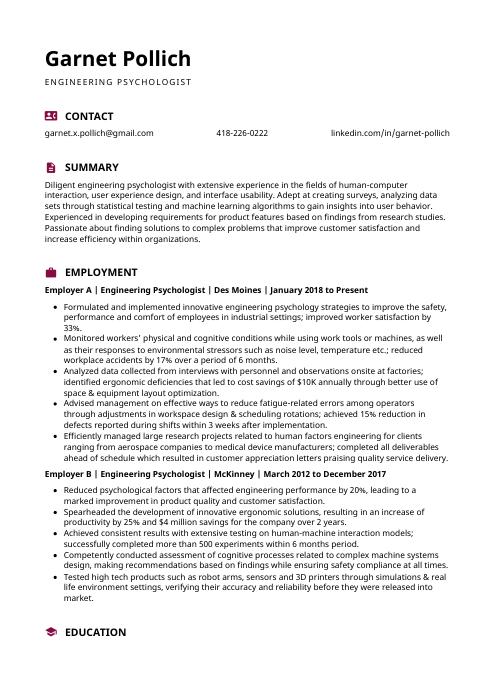 Hoopoe
Hoopoe Rezjumei
Rezjumei
